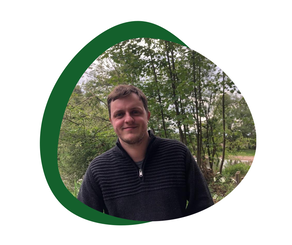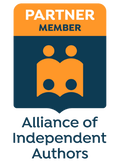Dan Moore
Published Books
Haunted Fields (2014) BUY ON AMAZON = https://amzn.to/46r0THx
Who are you? Tell us a little about yourself...
I work in agriculture and live on a farm in rural Lincolnshire with my fiancé, two children and two step-children. I also write fiction, these days aimed primarily at adults. I’ve always had a vivid imagination and have loved stories for as long as I can remember, though I didn’t start scribbling my own ideas down on paper until I was about seventeen.
What first inspired you to start writing?
I was just looking for a creative outlet, a way of making sense of my thoughts. As a teenager I couldn’t always express myself clearly with words, but given time I could with a pen. Back then it seemed an obscure activity to be involved in. Social media wasn’t a big deal, and I didn’t know anyone else who wrote. I bought a ton of self-help books, would pick up a copy of Writing Magazine each month, and just had a go! (For anyone who’s interested, my three favourite self-help books are: On Writing: A Memoir of the Craft by Stephen King, Save the Cat! Writes a Novel: The Last Book on Novel Writing You’ll Ever Need by Jessica Brody, and Plot and Structure by James Scott Bell).
What made you want to work with Rowanvale and be published?
I just thought it would be fun to get some work out there. Everyone at Rowanvale was helpful, friendly and incredibly professional, and they made the whole publishing process enjoyable. It was a real collaborative effort! There was also a level of involvement I just wasn’t expecting. Within days of working together my account manager was even suggesting a title change! Rowanvale really care about the work authors are putting out there, and they handle everything.
When you're not writing, what are you reading?
All sorts. I’ll read anything with a good story, though nowadays I tend to be drawn more to psychological thrillers or mysteries. Recently, I’ve been working my way through Ruth Ware’s novels – I’ve just finished The Death of Mrs. Westaway. Others I’ve particularly enjoyed in recent years are: Sharp Objects by Gillian Flynn, The Farm by Tom Rob Smith, and The Woman in the Window by AJ Finn.
Which work are you most proud of?
I’d have to say my first completed novel. Haunted Fields was born from a sub-plot in a much larger book I wrote for young adults called A Battle Worth Fighting. Some chapters in that first book went through fifteen drafts or more, so typing “The End” after four years of toil was an amazing feeling. I was in my early twenties at the time and incredibly naïve, so I submitted the manuscript to a handful of agents, hoping to become the next J.K. Rowling. After a few weeks the dreaded rejection slips came back in the post, but I was galvanised by some of the great feedback in a couple of the replies. One agent put me in touch with Cornerstones Literary Consultancy. An editor of theirs—a fantastic children’s author— produced a report on my book, helped me reshape the plot and gave me priceless advice on improving my writing—including pointing out where I’d fallen foul of the common beginner pitfall of telling rather than showing! I didn’t write much in the years that followed and when Rowanvale contacted me on Twitter, I decided it was time to just get some work out there and publish Haunted Fields independently.
What's your best advice for handling writer's block?
Just relax and try and have some fun with your writing. You could always write something else. Failing that, pick up a book and read, or just do something else completely unconnected to writing. But remember, the words will come eventually!
What's one thing you always have with you when writing?
I only need writing material really. That could be pen and paper, a laptop or even the notes on my phone. Life is busy these days so I often write in short bursts of five or ten minutes. I prefer to write by hand if I can and then type up later. I also like a bit of background noise, as long as it’s not too loud or too distracting. I always used to have a thesaurus by my side when writing but now I just use the internet to find a more suitable word.
What is the one book you would take with you if you were stuck on a desert island?
If I knew I was going to be stranded on a desert island, then probably something written by Bear Grylls! If I were to take a work of fiction, then perhaps The Great Gatsby by F. Scott Fitzgerald. This is a tricky one, by the way; there are dozens I could have chosen. But Gatsby is one I regularly come back to. A tragedy set in the Jazz Age of the 1920s, Gatsby is Fitzgerald’s pessimistic take on the American dream. Rightly considered a classic, Fitzgerald’s prose is exquisite, every sentence perfectly crafted. Other notable candidates would be The Girl with the Dragon Tattoo by Stieg Larsson or The Wasp Factory by Iain Banks, or even any of the Harry Potter books.
What is the best part about being an independently published author?
Freedom. Freedom to write whatever you like, within reason. There’s also a greater involvement in the whole publishing process. You also retain the rights to your work.
What's next for you?
I’m currently writing a psychological thriller for adults, which I’m taking my time with. I’m waiting until the book is finished before deciding what to do with it. It’s a dream of mine to be published traditionally, to see my book on bookshop shelves, but I’ll certainly consider publishing independently again. Working with Rowanvale has been a fantastic experience.
Haunted Fields (2014) BUY ON AMAZON = https://amzn.to/46r0THx
Who are you? Tell us a little about yourself...
I work in agriculture and live on a farm in rural Lincolnshire with my fiancé, two children and two step-children. I also write fiction, these days aimed primarily at adults. I’ve always had a vivid imagination and have loved stories for as long as I can remember, though I didn’t start scribbling my own ideas down on paper until I was about seventeen.
What first inspired you to start writing?
I was just looking for a creative outlet, a way of making sense of my thoughts. As a teenager I couldn’t always express myself clearly with words, but given time I could with a pen. Back then it seemed an obscure activity to be involved in. Social media wasn’t a big deal, and I didn’t know anyone else who wrote. I bought a ton of self-help books, would pick up a copy of Writing Magazine each month, and just had a go! (For anyone who’s interested, my three favourite self-help books are: On Writing: A Memoir of the Craft by Stephen King, Save the Cat! Writes a Novel: The Last Book on Novel Writing You’ll Ever Need by Jessica Brody, and Plot and Structure by James Scott Bell).
What made you want to work with Rowanvale and be published?
I just thought it would be fun to get some work out there. Everyone at Rowanvale was helpful, friendly and incredibly professional, and they made the whole publishing process enjoyable. It was a real collaborative effort! There was also a level of involvement I just wasn’t expecting. Within days of working together my account manager was even suggesting a title change! Rowanvale really care about the work authors are putting out there, and they handle everything.
When you're not writing, what are you reading?
All sorts. I’ll read anything with a good story, though nowadays I tend to be drawn more to psychological thrillers or mysteries. Recently, I’ve been working my way through Ruth Ware’s novels – I’ve just finished The Death of Mrs. Westaway. Others I’ve particularly enjoyed in recent years are: Sharp Objects by Gillian Flynn, The Farm by Tom Rob Smith, and The Woman in the Window by AJ Finn.
Which work are you most proud of?
I’d have to say my first completed novel. Haunted Fields was born from a sub-plot in a much larger book I wrote for young adults called A Battle Worth Fighting. Some chapters in that first book went through fifteen drafts or more, so typing “The End” after four years of toil was an amazing feeling. I was in my early twenties at the time and incredibly naïve, so I submitted the manuscript to a handful of agents, hoping to become the next J.K. Rowling. After a few weeks the dreaded rejection slips came back in the post, but I was galvanised by some of the great feedback in a couple of the replies. One agent put me in touch with Cornerstones Literary Consultancy. An editor of theirs—a fantastic children’s author— produced a report on my book, helped me reshape the plot and gave me priceless advice on improving my writing—including pointing out where I’d fallen foul of the common beginner pitfall of telling rather than showing! I didn’t write much in the years that followed and when Rowanvale contacted me on Twitter, I decided it was time to just get some work out there and publish Haunted Fields independently.
What's your best advice for handling writer's block?
Just relax and try and have some fun with your writing. You could always write something else. Failing that, pick up a book and read, or just do something else completely unconnected to writing. But remember, the words will come eventually!
What's one thing you always have with you when writing?
I only need writing material really. That could be pen and paper, a laptop or even the notes on my phone. Life is busy these days so I often write in short bursts of five or ten minutes. I prefer to write by hand if I can and then type up later. I also like a bit of background noise, as long as it’s not too loud or too distracting. I always used to have a thesaurus by my side when writing but now I just use the internet to find a more suitable word.
What is the one book you would take with you if you were stuck on a desert island?
If I knew I was going to be stranded on a desert island, then probably something written by Bear Grylls! If I were to take a work of fiction, then perhaps The Great Gatsby by F. Scott Fitzgerald. This is a tricky one, by the way; there are dozens I could have chosen. But Gatsby is one I regularly come back to. A tragedy set in the Jazz Age of the 1920s, Gatsby is Fitzgerald’s pessimistic take on the American dream. Rightly considered a classic, Fitzgerald’s prose is exquisite, every sentence perfectly crafted. Other notable candidates would be The Girl with the Dragon Tattoo by Stieg Larsson or The Wasp Factory by Iain Banks, or even any of the Harry Potter books.
What is the best part about being an independently published author?
Freedom. Freedom to write whatever you like, within reason. There’s also a greater involvement in the whole publishing process. You also retain the rights to your work.
What's next for you?
I’m currently writing a psychological thriller for adults, which I’m taking my time with. I’m waiting until the book is finished before deciding what to do with it. It’s a dream of mine to be published traditionally, to see my book on bookshop shelves, but I’ll certainly consider publishing independently again. Working with Rowanvale has been a fantastic experience.



